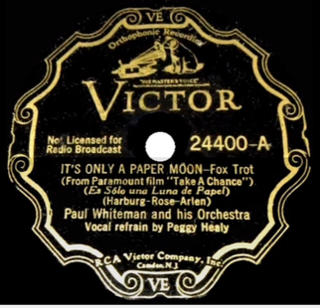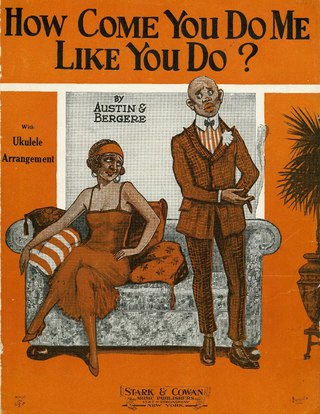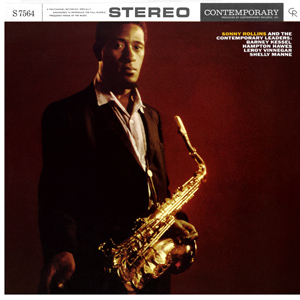Related Research Articles
"What Is This Thing Called Love?" is a 1929 popular song written by Cole Porter, for the musical Wake Up and Dream. It was first performed by Elsie Carlisle in March 1929. The song has become a popular jazz standard and one of Porter's most often played compositions.

"The Way You Look To-night" is a song from the film Swing Time that was performed by Fred Astaire and composed by Jerome Kern with lyrics written by Dorothy Fields. It won the Academy Award for Best Original Song in 1936. Fields remarked, "The first time Jerry played that melody for me I went out and started to cry. The release absolutely killed me. I couldn't stop, it was so beautiful."

"It's Only a Paper Moon" is a popular song published in 1933 with music by Harold Arlen and lyrics by Yip Harburg and Billy Rose.
"I'll Remember April" is a popular song and jazz standard with music written in 1941 by Gene de Paul, and lyrics by Patricia Johnston and Don Raye. It made its debut in the 1942 Abbott and Costello comedy Ride 'Em Cowboy, being sung by Dick Foran. The lyric uses the seasons of the year metaphorically to illustrate the growth and death of a romance. The lyric also uses the ideas of the hours in a day and the flames of a fire to illustrate a relationship growing stronger and subsequently losing strength. Another interpretation is the use of spring to express the loves that were had in youth and remember them when the autumn of life arrives with affection and nostalgia, smiling: "I'll remember April and I smile". The song has been described as one which makes use of nostalgia.
"It Could Happen to You" is a popular standard with music by Jimmy Van Heusen and lyrics by Johnny Burke. The song was written in 1943 and was introduced by Dorothy Lamour in the Paramount musical comedy film And the Angels Sing (1944).

"Rock-a-Bye Your Baby with a Dixie Melody" is a popular song written by Jean Schwartz, with lyrics by Sam M. Lewis and Joe Young. The song was introduced by Al Jolson in the Broadway musical Sinbad and published in 1918.

"Basin Street Blues" is a song often performed by Dixieland jazz bands, written by Spencer Williams in 1928 and recorded that year by Louis Armstrong. The verse with the lyric "Won't you come along with me / To the Mississippi..." was later added by Glenn Miller and Jack Teagarden.
"Fine and Dandy" is a popular song from the 1930 Broadway musical of the same name.

"Everybody Loves My Baby", also known as "Everybody Loves My Baby, but My Baby Don't Love Nobody but Me", is a popular and jazz standard song composed by Spencer Williams in 1924. Lyrics were written by Jack Palmer.
"What's New?" is a 1939 popular song composed by Bob Haggart, with lyrics by Johnny Burke. It was originally an instrumental tune titled "I'm Free" by Haggart in 1938, when Haggart was a member of Bob Crosby and His Orchestra. The tune was written with a trumpet solo, meant to showcase the talents of band-mate Billy Butterfield. Crosby's orchestra recorded "I'm Free" the same day it was written.
"What a Little Moonlight Can Do" is a popular song written by Harry M. Woods in 1934. In 1934, Woods moved to London for three years where he worked for the British film studio Gaumont British, contributing material to several films, one of which was Road House (1934). The song was sung in the film by Violet Lorraine and included an introductory verse, not heard in the version later recorded by Billie Holiday in 1935.
"Them There Eyes" is a jazz song written by Maceo Pinkard, Doris Tauber, and William Tracey that was published in 1930. One of the early recorded versions was performed by Louis Armstrong in 1931. It was made famous by Billie Holiday, who recorded her version in 1939 for Vocalion Records. A version by Emile Ford & The Checkmates reached number 18 on the UK Singles Chart in 1960.
"Alone Together" is a song composed by Arthur Schwartz with lyrics by Howard Dietz. It was introduced in the Broadway musical Flying Colors in 1932 by Jean Sargent.

"Out of Nowhere" is a popular song composed by Johnny Green with lyrics by Edward Heyman and published by Famous Music. It was popularized by Bing Crosby, and was the first recording under his Brunswick Records contract. He recorded it on March 30, 1931 and it became his first number one hit as a solo artist. Crosby also sang it in the film Confessions of a Co-Ed (1931) and in his short film I Surrender Dear (1931). He recorded it again in 1954 for his album Bing: A Musical Autobiography.

"How Come You Do Me Like You Do?" is a song written by vaudeville comedy duo Gene Austin and Roy Bergere in 1924. It has later been covered by many artists, and is considered a jazz standard.

"Margie", also known as "My Little Margie", is a 1920 popular song composed in collaboration by vaudeville performer and pianist Con Conrad and ragtime pianist J. Russel Robinson, a member of the Original Dixieland Jazz Band. Lyrics were written by Benny Davis, a vaudeville performer and songwriter. The song was introduced by the Original Dixieland Jazz Band in 1920 as Victor 78, 18717-A, in a medley paired with "Singin' the Blues". The B side was "Palesteena". The ODJB recorded their instrumental version on December 1, 1920.
Other popular versions in 1920-21 were by Gene Rodemich; Eddie Cantor; Ted Lewis; and Frank Crumit. The Rega Dance Orchestra recorded the song in October, 1920 for Okeh Records, 4211.
"Sugar", also known as "That Sugar Baby o' Mine", is a popular song by Maceo Pinkard, his wife Edna Alexander and Sidney D. Mitchell. Recorded by Ethel Waters on February 20, 1926, it soon achieved chart success.

Sonny Rollins and the Contemporary Leaders is a 1959 album by jazz saxophonist Sonny Rollins, recorded for the Contemporary label, featuring performances by Rollins with Hampton Hawes, Barney Kessel, Leroy Vinnegar, and Shelly Manne with Victor Feldman added on one track. It was the last studio record Rollins made in the 1950s. Following the recording of "Sonny Rollins and the Contemporary Leaders", Rollins toured Europe in the spring of 1959, then took a hiatus from recording and performing in public that ended in 1962 with his LP The Bridge.

"Poinciana" is a song by Nat Simon with English lyrics by Buddy Bernier and Spanish lyrics written in 1936 by Manuel Lliso.
"The Moon of Manakoora" is a popular song written by Frank Loesser (lyrics) and Alfred Newman (music) for the 1937 Paramount film The Hurricane starring Dorothy Lamour. Lamour sang the song in the film and also made a commercial recording of it. The song "The Moon of Manakoora" is considered a standard and was Loesser's first success as a lyric writer.
References
- 1 2 Jeremy Wilson: I've Found a New Baby overview at jazzstandards.com - retrieved on 20 May 2009
- ↑ Whitburn, Joel (1986). Joel Whitburn's Pop Memories 1890-1954 . Wisconsin, USA: Record Research Inc. p. 524. ISBN 0-89820-083-0.
- ↑ "A Bing Crosby Discography". BING magazine. International Club Crosby. Retrieved July 27, 2017.
- ↑ William Emmett Studwell and Mark Baldwin: The Big Band Reader: Songs Favored by Swing Era Orchestras and Other Popular Ensembles. Haworth Press, 2000. ISBN 0-7890-0914-5. p. 25.
- ↑ Noah Baerman: I've Found a New Baby analysis at jazzstandards.com - retrieved on 20 May 2009
- ↑ Yanow, Scott. "Sonny Rollins and the Contemporary Leaders". allmusic.com. Retrieved 22 April 2023.